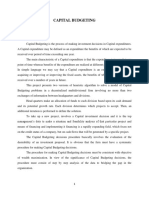Finance Abstract
Finance Abstract
Uploaded by
utsavCopyright:
Available Formats
Finance Abstract
Finance Abstract
Uploaded by
utsavCopyright
Available Formats
Share this document
Did you find this document useful?
Is this content inappropriate?
Copyright:
Available Formats
Finance Abstract
Finance Abstract
Uploaded by
utsavCopyright:
Available Formats
CAPITAL BUDGETING
Capital budgeting refers to the process we use to make decisions concerning investments in
the longterm assets of the firm. The general idea is that the capital, or long-term funds, raised
by the firms are used to invest in assets that will enable the firm to generate revenues several
years into the future. Often the funds raised to invest in such assets are not unrestricted, or
infinitely available; thus the firm must budget how these funds are invested.
Importance of Capital Budgetingbecause capital budgeting decisions impact the firm for
several years, they must be carefully planned. A bad decision can have a significant effect on
the firms future operations. In addition, the timing of the decisions is important. Many
capital budgeting projects take years to implement. If firms do not plan accordingly, they
might find that the timing of the capital budgeting decision is too late, thus costly with
respect to competition. Decisions that are made too early can also be problematic because
capital budgeting projects generally are very large investments, thus early decisions might
generate unnecessary costs for the firm
Pay Back Period (PBP) : The pay back period (PBP) is the traditional method of capital
budgeting. It is the simplest and perhaps, the most widely used quantitative method for
appraising capital expenditure decision.
REESEARCH METHODOLOGY- The researcher is using the primary data by collecting
the Balance sheet of 5 different companies. The researcher has selected 5 Cellular companies
such as idea, BSNL, Bharti Airtel, Relience and MTNL. The researcher will be using the
traditional method so as to get the accurate results.
You might also like
- Attachment Co-Founders Agreement Template DetailedDocument26 pagesAttachment Co-Founders Agreement Template Detailedutsav100% (4)
- Capital Budgeting HDFCDocument68 pagesCapital Budgeting HDFCKasiraju Saiprathap43% (7)
- A Study On Capital BudgetingDocument80 pagesA Study On Capital BudgetingSparsh RastogiNo ratings yet
- CAPITAL BUDGETING Ultratech Cements 2015Document87 pagesCAPITAL BUDGETING Ultratech Cements 2015Nair D Sravan50% (2)
- Capital Budgeting: A Project Report ONDocument9 pagesCapital Budgeting: A Project Report ONMohmmedKhayyumNo ratings yet
- Report CCCCDocument107 pagesReport CCCCUtkarsh BajpaiNo ratings yet
- Litrature SharibDocument3 pagesLitrature Sharibmdhanjalah08No ratings yet
- Padma Supriya - 014Document8 pagesPadma Supriya - 014ammukhan khanNo ratings yet
- Capital Budgeting Modify 1Document72 pagesCapital Budgeting Modify 1bhaskarganeshNo ratings yet
- A Study On Capital Budgetting With Reference To Bescal Steel IndustriesDocument69 pagesA Study On Capital Budgetting With Reference To Bescal Steel IndustriesAman Agarwal100% (2)
- APGENCO - Capital BudgetingDocument73 pagesAPGENCO - Capital Budgetingkrishna saiNo ratings yet
- Significance of Capital BudgetingDocument2 pagesSignificance of Capital BudgetingLJBernardo0% (1)
- Capital BudgetingDocument2 pagesCapital BudgetingBrajmohan RayNo ratings yet
- HyundaiDocument6 pagesHyundaiRahul KumarNo ratings yet
- Capital Budgeting KesoramDocument66 pagesCapital Budgeting KesoramSridevi padamatiNo ratings yet
- Raj FinalDocument58 pagesRaj Finalraj1415No ratings yet
- Capital BudgetingDocument35 pagesCapital Budgetinggkvimal nathan100% (3)
- Capital Budgeting Is Finance Terminology For The Process of Deciding Whether or Not To Undertake An Investment Project.Document14 pagesCapital Budgeting Is Finance Terminology For The Process of Deciding Whether or Not To Undertake An Investment Project.Utkarsh BajpaiNo ratings yet
- Capital Budgeting - ZuariDocument90 pagesCapital Budgeting - Zuarirajbandaru36No ratings yet
- .... Capital Budgeting at YES BankDocument50 pages.... Capital Budgeting at YES Bankmoula nawazNo ratings yet
- Capital Budgeting ResearchDocument21 pagesCapital Budgeting ResearchNour FawazNo ratings yet
- Capital BudgetingDocument14 pagesCapital BudgetingrdaaducalNo ratings yet
- Chapter - IDocument65 pagesChapter - Iarjunmba119624No ratings yet
- Mayur Final Project 2Document75 pagesMayur Final Project 2Mala.hrNo ratings yet
- A Study On Capital Budgeting at Ultratech CementsDocument68 pagesA Study On Capital Budgeting at Ultratech CementsRajesh BathulaNo ratings yet
- Financial Management II Unit Capital Budgeting (Highlighted)Document13 pagesFinancial Management II Unit Capital Budgeting (Highlighted)Prashant KangtikarNo ratings yet
- Capital Budgeting-Research FinalDocument22 pagesCapital Budgeting-Research FinalNour Fawaz100% (1)
- Capital Budjeting NagarjunaDocument73 pagesCapital Budjeting NagarjunaSanthosh Soma100% (2)
- L - 2 Capital BudgetingDocument13 pagesL - 2 Capital Budgetingyugabhore1234No ratings yet
- Investment Appraisal MethodsDocument15 pagesInvestment Appraisal MethodsFaruk Hossain100% (1)
- Cap Bud Ultratech 19Document9 pagesCap Bud Ultratech 19feroz khanNo ratings yet
- Ajith ProjectDocument89 pagesAjith ProjectAnonymous MhCdtwxQINo ratings yet
- Fplanning 2Document61 pagesFplanning 2bagyaNo ratings yet
- Capital BudgetingDocument65 pagesCapital Budgetingarjunmba119624No ratings yet
- Chapter 4 - Capital BudgetingDocument3 pagesChapter 4 - Capital BudgetingChaitu Un PrediCtbleNo ratings yet
- Financial Forecasting and Planning - InDIA CEMENTDocument49 pagesFinancial Forecasting and Planning - InDIA CEMENTRavi Mudiraj PolaboinaNo ratings yet
- Capital Budgeting HDFC (1) - 1Document61 pagesCapital Budgeting HDFC (1) - 1prem kumarNo ratings yet
- Introduction To Investment Decision in Financial Management (Open Compatibility)Document5 pagesIntroduction To Investment Decision in Financial Management (Open Compatibility)karl markxNo ratings yet
- Topic 3-Investment Decisions (Capital Budgeting) - Investment Appraisals TechniquesDocument12 pagesTopic 3-Investment Decisions (Capital Budgeting) - Investment Appraisals Techniquesngezerojas57No ratings yet
- Capital Budgeting Project ReportDocument97 pagesCapital Budgeting Project ReportPriyanshu Singh0% (1)
- Chapter-I: Capital BudgetingDocument49 pagesChapter-I: Capital BudgetingYugandhar SivaNo ratings yet
- Capital BudgetingDocument17 pagesCapital BudgetingAditya SinghNo ratings yet
- Synopsis Capital Budgeting Reddy's LabshjklhjlDocument10 pagesSynopsis Capital Budgeting Reddy's LabshjklhjlSaidi ReddyNo ratings yet
- Cap Bud Maruti 24Document93 pagesCap Bud Maruti 24Gamers worldNo ratings yet
- Management of Capital BudgetingDocument4 pagesManagement of Capital BudgetingMuhammad Furqan AkramNo ratings yet
- Capital BudgetingDocument15 pagesCapital BudgetingrahaaritNo ratings yet
- Chapter-I Introduction To Project Budget: Capital Budgeting TechniquesDocument3 pagesChapter-I Introduction To Project Budget: Capital Budgeting TechniquesvishanthNo ratings yet
- FINANCIAL FORECASTING AND PLANNING SynopsisDocument17 pagesFINANCIAL FORECASTING AND PLANNING Synopsismudigonda snehaNo ratings yet
- Cost of Capital - Mcom II ProjectDocument36 pagesCost of Capital - Mcom II ProjectKunal KapoorNo ratings yet
- FM Unit 2 CB Part B QaDocument6 pagesFM Unit 2 CB Part B QaVasugi KumarNo ratings yet
- Objectives of The StudyDocument3 pagesObjectives of The StudywilbertNo ratings yet
- Bba FM Notes Unit IiiDocument7 pagesBba FM Notes Unit IiiSunita SehgalNo ratings yet
- Capital BudgetingDocument7 pagesCapital BudgetingkanizfatemachoNo ratings yet
- Importance of Capital BudgetingDocument4 pagesImportance of Capital BudgetingSauhard AlungNo ratings yet
- To Investment Decision in Financial ManagementDocument15 pagesTo Investment Decision in Financial Managementpalakurthi_palakurthNo ratings yet
- Capital Budgeting - Maruti SuzukiDocument65 pagesCapital Budgeting - Maruti SuzukiMANISH REDDYNo ratings yet
- Session - 036Document4 pagesSession - 036Abcdef GhNo ratings yet
- A Study On Capital Budgeting.Document15 pagesA Study On Capital Budgeting.Kumar SwamyNo ratings yet
- The Nine Principles of Agile Planning: Create Nimble and Dynamic Forecasting in Your OrganizationFrom EverandThe Nine Principles of Agile Planning: Create Nimble and Dynamic Forecasting in Your OrganizationNo ratings yet
- Assignment Guidelines: Diploma in Entrepreneurship Administration and Business LawsDocument3 pagesAssignment Guidelines: Diploma in Entrepreneurship Administration and Business LawsutsavNo ratings yet
- MQ 64265Document107 pagesMQ 64265utsavNo ratings yet
- Iumcc 2017 ResultsDocument23 pagesIumcc 2017 ResultsutsavNo ratings yet
- RK GargDocument1 pageRK GargutsavNo ratings yet
- Rules CompetitionDocument23 pagesRules CompetitionutsavNo ratings yet
- Case Laws PranavDocument1 pageCase Laws PranavutsavNo ratings yet
- Artikel CIA Multi Tier Clauses (00746554) (1) OosDocument11 pagesArtikel CIA Multi Tier Clauses (00746554) (1) OosutsavNo ratings yet
- Pre Arbitration Negotiation BESTDocument4 pagesPre Arbitration Negotiation BESTutsavNo ratings yet




































































